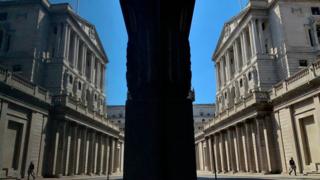Bank and Church of England apologise for historic slavery ties
 Image copyright Getty Images
Image copyright Getty Images The UK’s central bank and the Church of England have both apologised for the role that some of their senior figures played in the slave trade.
Former Bank of England governors and directors profited from slavery, as did a bishop and dozens of other clergymen.
The Bank said it would ensure that images of former governors who were involved in the slave trade are not displayed in its buildings.
The Church described its history as a «source of shame».
«Slavery and exploitation have no place in society,» a Church spokeswoman said.
Slaves branded
In 2006, the Church voted to apologise to the descendants of victims of the slave trade.
Its missionary arm, the Society for the Propagation of the Christian Religion in Foreign Parts (SPG), inherited three sugar estates in the Caribbean.
The plantation was run for the Church by professional planters, but its profits went to the missionary group. Slaves working on the estate were branded on their chests with the word «society».
And now, the Daily Telegraph has reported that nearly 100 clergymen also benefitted individually from slavery.
«While we recognise the leading role clergy and active members of the Church of England played in securing the abolition of slavery, it is a source of shame that others within the Church actively perpetrated slavery and profited from it,» the spokeswoman said.
When slavery was abolished in 1833, the UK government raised huge amounts for compensation. However, that money was not paid to those who had been enslaved, but was given instead to slave-owners for their «loss of human property».
‘Unacceptable part of history’
A database compiled by University College London shows that at least 11 former Bank governors and 16 early directors either benefitted from those payments or had links to the slave trade.
«There can be no doubt that the 18th and 19th Century slave trade was an unacceptable part of English history,» a Bank spokeswoman said.
«As an institution, the Bank of England was never itself directly involved in the slave trade, but is aware of some inexcusable connections involving former governors and directors and apologises for them.»
She said the Bank had started a «thorough review» of its image collection to ensure no pictures of anyone involved in the slave trade remained on display.
Pressure has been growing on companies around the world to address links to slavery and tackle racial inequality following the death of George Floyd in the US last month while in police custody.
Videos showed Mr Floyd, who was unarmed and in handcuffs, dying after a white policeman knelt on his neck for nearly nine minutes.
On Wednesday, pub chain Greene King and insurance market Lloyd’s of London also apologised for their historical links to the slave trade.
One of Greene King’s founders owned a number of plantations in the Caribbean, while the maritime insurance business, which centred around Lloyd’s, thrived on the trans-Atlantic slave trade.


